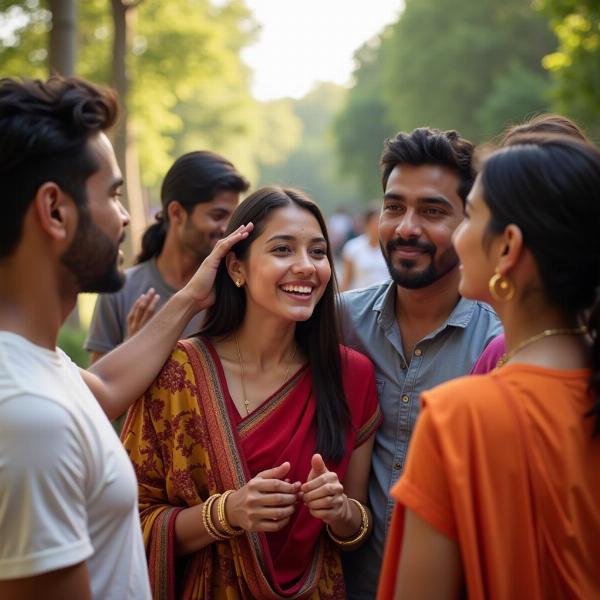Understanding the nuances of compliments and expressions of admiration is crucial when navigating different languages and cultures. If you’re curious about how to express “pretty as always” in Hindi, you’ve come to the right place. This article will delve into various ways to convey this sentiment, exploring the cultural context and offering practical examples. “Pretty as always” implies a consistent appreciation of someone’s beauty, acknowledging their enduring attractiveness.
Conveying “Pretty As Always” in Hindi
Translating “pretty as always” directly into Hindi can be tricky. The essence of the phrase lies in acknowledging sustained beauty. Therefore, we need to capture that meaning rather than focusing on a literal translation. Here are several options, catering to different levels of formality and relationships:
-
Hamesha ki tarah sundar (हमेंशा की तरह सुंदर): This is a more literal translation, meaning “beautiful as always.” It’s a straightforward and respectful option.
-
Aap hamesha hi khoobsurat lagti hain (आप हमेशा ही खूबसूरत लगती हैं) (for females):/ Aap hamesha hi khoobsurat lagte hain (आप हमेशा ही खूबसूरत लगते हैं) (for males): This translates to “You always look beautiful.” It emphasizes the ongoing nature of their attractiveness.
-
Pehle jaisi sundar (पहले जैसी सुंदर): This translates to “Beautiful like before,” implying their beauty hasn’t faded. It’s suitable for someone you haven’t seen in a while.
-
Tum hamesha itni pyari lagti ho (तुम हमेशा इतनी प्यारी लगती हो) (for females) / Tum hamesha itne pyare lagte ho (तुम हमेशा इतने प्यारे लगते हो) (for males) (informal): This translates to “You always look so lovely.” Use this with close friends or family, as “tum” is informal.
Cultural Nuances of Compliments in India
Compliments in India are often expressed with warmth and genuine appreciation. They are a way of acknowledging beauty, both inner and outer. It’s important to be mindful of the context and relationship when offering compliments. Overly effusive praise can be perceived as insincere, while understated compliments are often appreciated for their authenticity.
What does “sundar” mean?
“Sundar (सुंदर)” is the most common Hindi word for “beautiful.” It’s a versatile word used to describe people, objects, and even abstract concepts.
Beyond “Sundar”: Exploring Other Compliments
While “sundar” is a good starting point, Hindi offers a rich vocabulary to express admiration. Words like “khoobsurat (खूबसूरत)” (beautiful), “manohar (मनोहर)” (charming), and “pyara/pyari (प्यारा/प्यारी)” (lovely/cute) add depth and nuance to your compliments.
 Hindi Compliments: Cultural Nuances in India
Hindi Compliments: Cultural Nuances in India
Practical Examples and Scenarios
Imagine meeting a friend you haven’t seen in a while. You could say, “Wow, you look pretty as always! (Vaah, tum pehle jaisi sundar lag rahi ho! / वाह, तुम पहले जैसी सुंदर लग रही हो!).”
Or, if you’re complimenting a colleague, you might say, “You look very presentable today, as always. (Aap aaj bahut achchi lag rahi hain, hamesha ki tarah / आप आज बहुत अच्छी लग रही हैं, हमेशा की तरह).” This is a more formal and professional way of expressing appreciation.
Conclusion
Expressing “pretty as always” in Hindi involves understanding the cultural context and choosing the appropriate phrasing. By using the examples provided and being mindful of the nuances of compliments in India, you can convey your admiration sincerely and respectfully. Remember, a genuine compliment can brighten someone’s day and strengthen your bond with them. “Pretty as always” transcends a simple compliment; it’s an affirmation of enduring beauty and appreciation.
FAQ
-
What’s the most common way to say “beautiful” in Hindi? Sundar (सुंदर) is the most common and versatile word for “beautiful” in Hindi.
-
Is it appropriate to compliment strangers in India? While it’s acceptable in some situations, it’s generally best to exercise caution and be mindful of cultural norms.
-
Can I use the same compliments for men and women? Some compliments are gender-neutral, while others are specifically for men or women. Pay attention to the gendered forms of words.
-
What if I’m not fluent in Hindi? Even a simple “Aap bahut achchi lag rahi hain (आप बहुत अच्छी लग रही हैं)” (for females)/ “Aap bahut achche lag rahe hain (आप बहुत अच्छे लग रहे हैं)” (for males) (You look very nice) can go a long way.
-
How can I learn more about Hindi compliments? Exploring Hindi language resources and interacting with native speakers can further enhance your understanding.
Looking for More Hindi Language Help?
Check out our other articles on Hindi meanings: what is the hindi meaning of decent and vinca meaning in hindi.
About Meaning-Hindi.in
Meaning-Hindi.in is your trusted partner for all your Hindi translation needs. We offer a comprehensive range of translation services, from business and legal documents to technical manuals and website localization. Our team of expert translators ensures accuracy and cultural sensitivity in every project. Whether you need a quick translation or a specialized linguistic solution, we’ve got you covered. Our expertise spans diverse fields, including business, legal, technical, website localization, educational, and specialized translations. Contact us today for a seamless and professional translation experience. Email: [email protected], Phone: +91 11-4502-7584. Let Meaning-Hindi.in bridge the language gap for you.